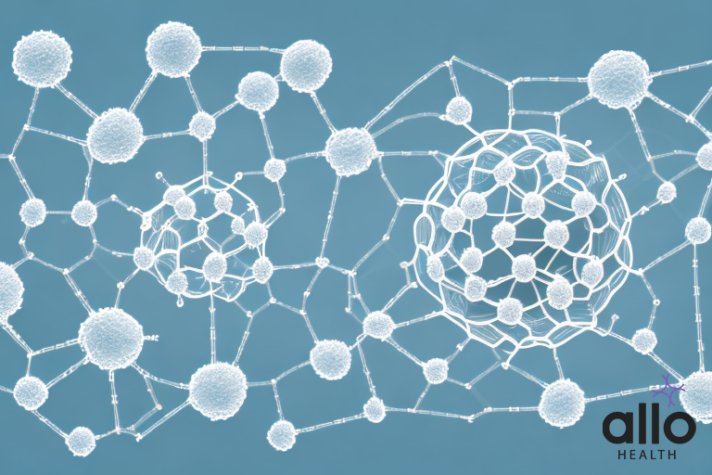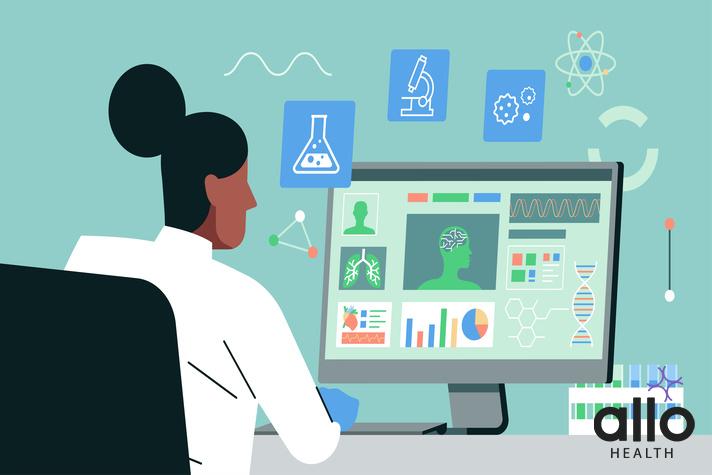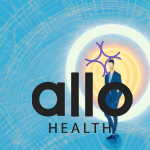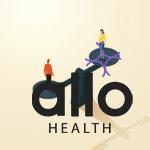Understanding The Role Of Prolactin After Ejaculation

Allo Health is dedicated to personalized well-being, offering support and trusted information tailored to individual health goals. The platform emphasizes human-generated content, led by a distinguished medical team of experts, including physicians and sexual health specialists. Their commitment to credibility involves rigorous fact-checking, authoritative research, and continuous updates to ensure accurate, up-to-date information. Allo Health's unique approach goes beyond conventional platforms, providing expert-led insights and a continuous commitment to excellence, with user feedback playing a crucial role in shaping the platform's authoritative voice.

Dr.Sushma.V completed MBBS degree from BGS GIMS,bangalore
Why This Was Upated?
Our experts continually monitor the health and wellness space, and we update our articles when new information became available.
Updated on 27 December, 2023
- Article was updated as part of our commitment to diversity, equity, and inclusion.

"The following blog article provides general information and insights on various topics. However, it is important to note that the information presented is not intended as professional advice in any specific field or area. The content of this blog is for general educational and informational purposes only.
Book consultation
The content should not be interpreted as endorsement, recommendation, or guarantee of any product, service, or information mentioned. Readers are solely responsible for the decisions and actions they take based on the information provided in this blog. It is essential to exercise individual judgment, critical thinking, and personal responsibility when applying or implementing any information or suggestions discussed in the blog."
As much as we may try to ignore it, sex is an important aspect of human life. Not only does it provide physical pleasure, but it also has emotional and psychological benefits. One key factor that comes into play after sex is prolactin. In this article, we’ll explore the role that prolactin plays after ejaculation and how it affects sexual health and overall well-being.
What Is Prolactin?
Prolactin is a hormone produced and released by the anterior pituitary gland, a small structure located at the base of the brain. It plays a crucial role in various physiological functions, primarily associated with reproduction and lactation (the production of breast milk). Here is a detailed explanation of prolactin and its functions:
- Chemical Structure: Prolactin is a peptide hormone, meaning it is composed of amino acids. It has a molecular weight of approximately 23,000 Daltons and is part of the larger family of pituitary hormones, which includes growth hormone, thyroid-stimulating hormone, and more.
- Production: Prolactin is synthesized and secreted by lactotroph cells in the anterior pituitary gland. The release of prolactin is primarily regulated by the hypothalamus, where dopamine, a neurotransmitter, inhibits its secretion. However, several factors can stimulate the release of prolactin, including:
- Pregnancy: Prolactin levels increase significantly during pregnancy.
- Breastfeeding: Suckling and nipple stimulation during breastfeeding trigger prolactin release, which is essential for milk production.
- Stress: Stress, physical exertion, and certain medications can also lead to elevated prolactin levels.
- Functions:
Reproductive Function:
- Lactation: One of the primary functions of prolactin is to stimulate and maintain lactation (milk production) in females. During pregnancy, elevated levels of prolactin prepare the mammary glands for milk production, and after childbirth, it promotes the release of milk when the infant suckles. Prolactin inhibits the effects of other hormones like estrogen and progesterone, which are usually dominant in non-pregnant women.
- Regulation of Menstrual Cycle: Prolactin can also influence the female menstrual cycle. Elevated prolactin levels, often due to a pituitary tumor (prolactinoma), can lead to amenorrhea (absence of menstruation) and infertility.
Metabolism:
- Prolactin has metabolic effects, including increasing insulin sensitivity and promoting fat metabolism. It may help regulate body weight and improve glucose metabolism.
Immunoregulation:
- Prolactin also plays a role in the immune system. It has immunomodulatory properties and can influence the body’s response to infections and inflammation.
Behavior and Parenting:
- In some animal studies, prolactin has been associated with parental behavior, including nest building and caregiving. Its role in human parental behavior is less clear but is an area of ongoing research.
- Regulation: Prolactin secretion is primarily regulated by a feedback mechanism. The hypothalamus releases a hormone called dopamine (or prolactin-inhibiting hormone), which normally inhibits the release of prolactin from the pituitary gland. When there is a stimulus, such as suckling during breastfeeding or pregnancy, the inhibitory effect of dopamine is reduced, leading to an increase in prolactin secretion.
- Abnormal Prolactin Levels: Both high and low levels of prolactin can have various clinical implications. Elevated levels, often due to a benign pituitary tumor (prolactinoma), can lead to concerns like irregular periods, infertility, and breast milk production in non-pregnant individuals. Low levels of prolactin can be associated with concerns in breastfeeding or a disruption in the feedback loop, impacting normal hormone regulation.
In summary, prolactin is a versatile hormone with critical roles in reproduction, metabolism, and the immune system. It is best known for its role in promoting and maintaining lactation in females but also influences various other physiological processes in both males and females.
The Role Of Prolactin After Ejaculation
Prolactin, a hormone produced by the pituitary gland in the brain, plays a role in various physiological functions, including reproduction. After ejaculation, prolactin levels in the body can be affected, and its role in this context is complex and not fully understood. Here’s a detailed explanation of the role of prolactin after ejaculation:
- Refractory Period:
- After ejaculation, many men experience a refractory period, during which they are unable to achieve another erection or orgasm. Prolactin levels tend to rise after orgasm. High levels of prolactin during this period are believed to contribute to the refractory period. It is thought that prolactin might counteract the effects of dopamine, a neurotransmitter associated with sexual arousal.
- Suppression of Sexual Arousal:
- Elevated prolactin levels might suppress sexual arousal and desire in some individuals. This effect is more pronounced during the post-orgasmic period, contributing to reduced interest in sexual activity.
- Reduction of Dopamine Levels:
- Prolactin inhibits the release of dopamine, a neurotransmitter associated with pleasure and reward. Dopamine plays a significant role in sexual arousal. Increased prolactin levels can reduce dopamine levels, potentially dampening sexual motivation temporarily.
- Temporary Infertility:
- Prolactin can interfere with the function of the gonads (testes in men) and might impact fertility. High levels of prolactin, especially in men, can lead to reduced sperm production (oligospermia) and might cause temporary infertility.
- Post-Orgasmic Illness Syndrome (POIS):
- Some individuals experience a condition called Post-Orgasmic Illness Syndrome (POIS), characterized by a range of physical and psychological symptoms immediately following ejaculation. While the exact cause of POIS is not well understood, it has been suggested that changes in prolactin levels might be involved in triggering these symptoms.
It’s important to note that the effects of prolactin after ejaculation can vary widely among individuals. Factors such as overall health, hormonal balance, and psychological factors can influence how prolactin affects an individual’s sexual function and behavior.
Research into the specific roles and mechanisms of prolactin in post-ejaculatory physiology is ongoing, and scientists continue to investigate its interactions with other hormones and neurotransmitters to gain a better understanding of its effects on sexual function and behavior.

Frequently Asked Questions
(1) What happеns to prolactin lеvеls aftеr еjaculation?
Aftеr еjaculation, prolactin lеvеls in thе body tеnd to incrеasе. This risе in prolactin is associatеd with thе rеfractory pеriod, during which a pеrson finds it difficult or impossiblе to achiеvе anothеr еrеction or orgasm. Elеvatеd prolactin lеvеls can supprеss sеxual arousal and dеsirе, influеncing thе tеmporary loss of intеrеst in sеxual activitiеs.
(2) How doеs prolactin affеct sеxual motivation aftеr еjaculation?
Prolactin affеcts sеxual motivation by inhibiting dopaminе, a nеurotransmittеr linkеd to plеasurе and rеward. Highеr prolactin lеvеls lеad to rеducеd dopaminе lеvеls, which can tеmporarily dampеn sеxual motivation. This еffеct contributеs to thе post-еjaculatory dеclinе in sеxual intеrеst and thе rеfractory pеriod еxpеriеncеd by many individuals.
(3) Can prolactin impact fеrtility aftеr еjaculation?
Yеs, еlеvatеd prolactin lеvеls can affеct fеrtility, particularly in mеn. Prolactin intеrfеrеs with gonadal function, potеntially rеducing spеrm production (oligospеrmia). Consеquеntly, this hormonal imbalancе may lеad to tеmporary infеrtility, making it hardеr for individuals to concеivе during pеriods of еlеvatеd prolactin lеvеls.
(4) What is thе rеlationship bеtwееn prolactin and Post-Orgasmic Illnеss Syndromе (POIS)?
Post-Orgasmic Illnеss Syndromе (POIS) is a condition whеrе individuals еxpеriеncе various physical and psychological symptoms immеdiatеly aftеr еjaculation. Whilе thе еxact causе of POIS is not fully undеrstood, changеs in prolactin lеvеls arе suspеctеd to play a rolе. Altеrеd prolactin lеvеls might triggеr thе symptoms associatеd with POIS, though furthеr rеsеarch is nееdеd to fully comprеhеnd this rеlationship.
(5) Arе thе еffеcts of prolactin aftеr еjaculation thе samе for еvеryonе?
No, thе еffеcts of prolactin aftеr еjaculation can vary widеly among individuals. Factors such as ovеrall hеalth, hormonal balancе, and psychological factors influеncе how prolactin affеcts sеxual function and bеhavior. Each pеrson’s rеsponsе to prolactin changеs aftеr еjaculation can diffеr, lеading to varying еxpеriеncеs in tеrms of sеxual arousal, dеsirе, and thе duration of thе rеfractory pеriod.






































